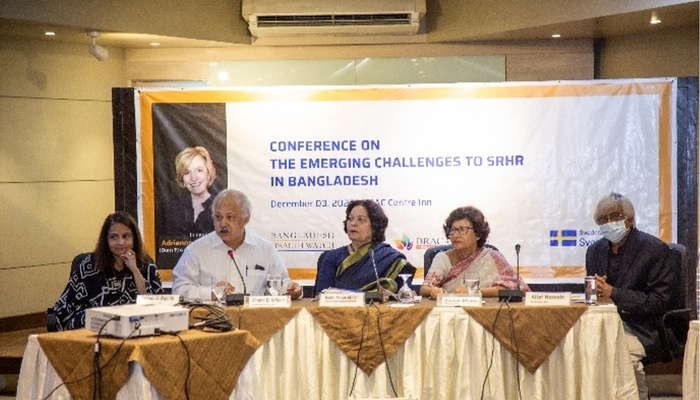

Bangladesh Health Watch (BHW), a citizens’ platform working as a watchdog to promote the health of Bangladesh citizens, organized a day-long conference on “The Emerging Challenges to Sexual and Reproductive Health and Rights (SRHR) in Bangladesh”. The conference was held on December 3, 2022 at BRAC Centre Inn, 75 Mohakhali, Dhaka.
Rounaq Jahan, Chair, Advisory Group, BHW presided over the conference. Paying tribute to Adrienne Germain, Rounaq Jahan talked about Adrienne Germain’s pioneering role in the 1970s and early 1980s in promoting girl’s and women’s rights and health through funding support of innovative government and non-government projects and programs to improve maternal and child health and increase opportunities for women’s employment and income. She was a strong supporter of Bangladesh government’s Menstrual Regulation (MR) program. She gained worldwide recognition for conceptualizing the Sexual and Reproductive Health and Rights (SRHR) framework for policies and programs in the health sector. SRHR was later endorsed by the ICPD in Cairo in 1994.
SRHR is selected as the theme of the conference to pay tribute to the memory of Adrienne Germain as she was a pioneer in developing SRHR approach of programming in health and population policy and program. All the papers presented in the conference underscore the need to recognize the socio-economic determinants of women’s health. They recommend adoption of specific measures to address the disadvantages women face so that they are enabled to realize their equal legal rights and access services on an equal footing with men.
The first session on Women, Girls, and SRHR in Bangladesh was chaired by Shams El Arifeen, Senior Director, Maternal and Child Health, icddr,b. Three papers were presented in this session. Kaosar Afsana, Professor, BRAC James P Grant School of Public Health, BRAC University, in her paper ‘Women at the Margin: The Reductionist Approach to Maternal Health’ asserted that although Bangladesh has seen a decline in maternal deaths over the years, social determinants, which impede further progress have been overlooked. She presented evidence on how women’s position in society makes them suffer from high maternal deaths and diseases. Sabina Faiz Rashid, Dean and Professor, BRAC James P Grant School of Public Health, BRAC University, spoke on ‘Fault Lines in Public Health: Young Women’s Lives in Dhaka Slums’ and asserted that gender, sexuality, and the human dimension of health need to be discussed in order to have contextually relevant programs and policies for young women living in slum environments. Medical anthropology are needed to move away from a ‘disease’ inside the body framework and understand how a holistic approach is needed for one’s sexual and reproductive health and well-being. Halida Hanum Akhtar, Senior Associate, Johns Hopkins University, Bloomberg School of Public Health and Altaf Hossain, Executive Director, Association for Prevention of Septic Abortion, Bangladesh (BAPSA), in their paper ‘The Bangladesh MR-MRM Programme: Successes, Challenges and Way Forward’ said that to achieve the SDG 3 target by 2030, Bangladesh needs to reduce unwanted pregnancy and its consequences on women’s lives. Bangladesh has in place a well -designed Menstrual Regulation (MR) programme, post abortion care (PAC) services, emergency contraceptive pills and community level awareness programs through social communication activities. However, lack of proper dispensing is reportedly causing more complications.
The second session of the conference focused on SRHR of Vulnerable Groups in Bangladesh and was chaired by Judith Bruce, Former Senior Associate, The Population Council. Ms. Bruce outlined several priorities including early and comprehensive support for the rising generation of girls -beginning in early adolescence in the communities characterized by persistent child marriage and poverty as well as those experiencing acute shocks of climate change and conflict. Judith stressed the need for establishing safe and supportive “all girl “meeting places to acquire vital health information.
In this session, Tasnim Azim, Adjunct Professor, BRAC James P Grant School of Public Health, BRAC University, in her paper explained that sexual and reproductive health are inextricably interlinked, and sexually transmitted infections (STIs) affect both. The paper identified the current need as to improve testing and treatment and address the structural and social barriers that impact sexual health. Sajeda Amin, Senior Associate, The Population Council, in her paper titled The Pathway of Climate Change Impact on SRHR expressed that there is an elevated risk to maternal health in coastal regions from increased salinity that increases the risk of eclampsia and pre-eclampsia, higher risk of child marriage and elevated risks of insecurity leading to sexual violence and rights violation as a result of displacement to urban slums. Sara Hossain, Honorary Executive Director, Bangladesh Legal Aid and Services Trust (BLAST), in her paper ‘Knowing and Using the Law to Shape Women’s and Girls’ Rights to Health’, suggested that there are laws that still discriminate against rights of women and girls to equality, not allowing women to participate freely and responsibly in decisions and processes that affect their lives.
The session was followed by an open discussion. A set of recommendations were made in the conference viewing to bring changes in favor of SRHR in the country. Some of the recommendations are; the maternal child health and family planning has not been reached among 21 % people, which need to be reached, proper implication of quality healthcare strategy should be ensured, rape pregnancy should be addressed in a serious lens, use of AI should be increased, use of telemedicine in family planning should be increased, sex education should be popularised, and supervisory and accountability system should be established in healthcare workforces.
About 86 experts, academicians, service providers, government and NGO representatives and media representatives attended the conference. The participants came up with several important recommendations for bringing progress and solutions to the challenges of SRHR in Bangladesh.
Citizen's Voice